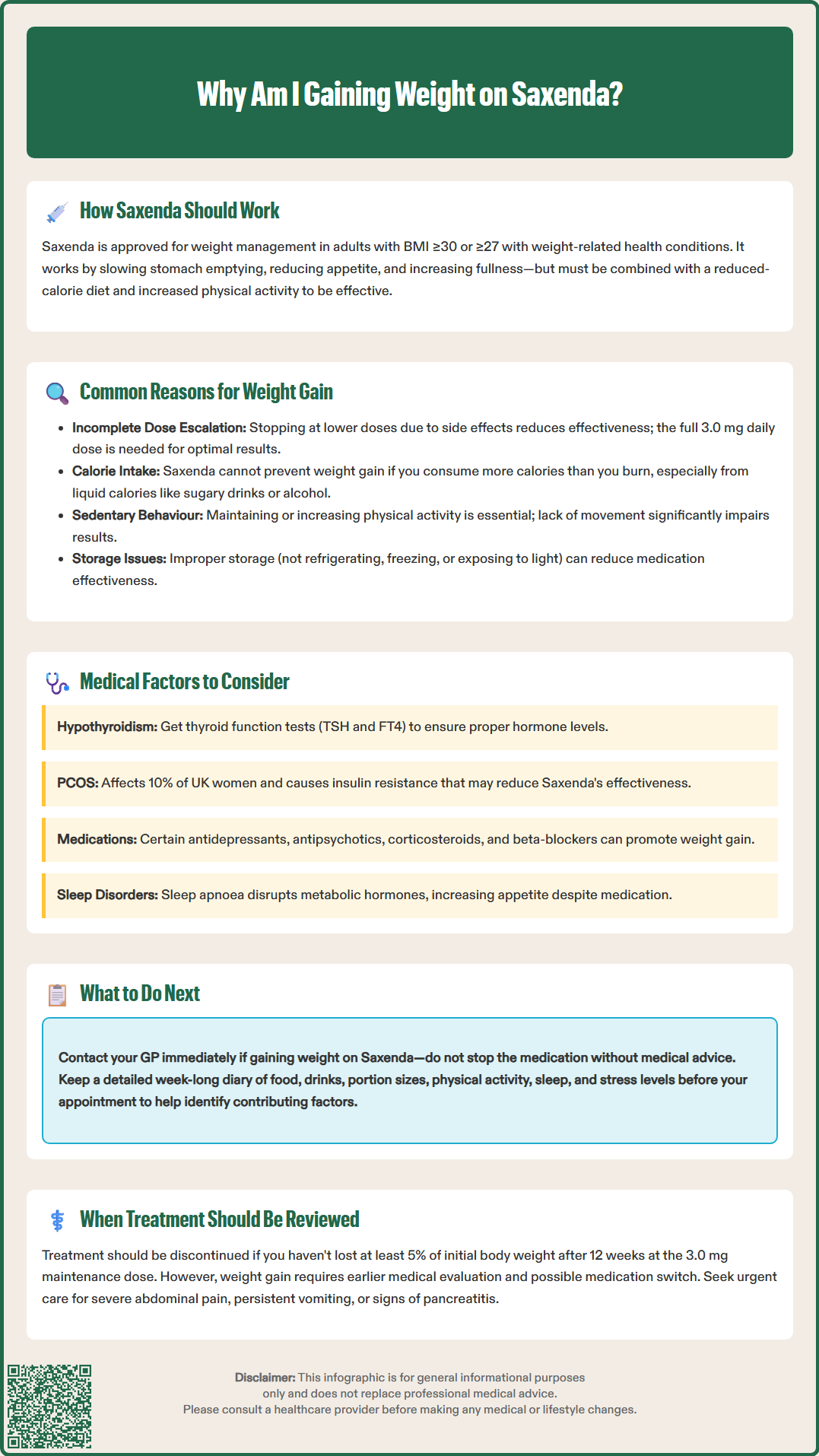
Saxenda (liraglutide 3.0 mg) is a GLP-1 receptor agonist licensed in the UK for weight management in adults with obesity or overweight with comorbidities. Whilst most patients achieve meaningful weight loss when Saxenda is combined with dietary modification and increased physical activity, some individuals experience unexpected weight gain or fail to lose weight as anticipated. This can be frustrating, particularly when adhering to treatment advice. Understanding why weight gain occurs on Saxenda requires consideration of multiple factors, including medication adherence, dietary habits, physical activity levels, underlying medical conditions, and individual metabolic responses. This article explores the reasons behind weight gain on Saxenda and provides guidance on addressing this concern with your healthcare provider.
Quick Answer: Weight gain on Saxenda can occur due to inadequate dosing, insufficient calorie restriction, reduced physical activity, underlying medical conditions such as hypothyroidism or PCOS, or medications that promote weight gain.

Mounjaro® is the most innovative GLP-1 medication proven to dramatically curb appetite, hunger, and cravings to help professional men achieve substantial weight loss.
Start Here
Wegovy® is a weekly injectable GLP-1 medication with proven effectiveness in reducing appetite, hunger, and cravings to help busy professionals lose significant weight.
Start HereSaxenda (liraglutide 3.0 mg) is a glucagon-like peptide-1 (GLP-1) receptor agonist licensed in the UK for weight management in adults with a BMI ≥30 kg/m², or ≥27–<30 kg/m² with at least one weight-related comorbidity. It should be used alongside a reduced-calorie diet and increased physical activity. Whilst clinical trials demonstrate that most patients achieve meaningful weight loss when Saxenda is combined with dietary modification and increased physical activity, some individuals experience weight gain or fail to lose weight as expected. This can be frustrating and concerning, particularly when you are following medical advice and adhering to treatment.
Weight gain is not a listed adverse reaction in the UK Summary of Product Characteristics (SmPC), but it can occur in clinical practice. Understanding why this happens requires consideration of multiple factors, including medication adherence, dietary habits, physical activity levels, underlying medical conditions, and individual metabolic responses. It is important to recognise that Saxenda is not a standalone solution—it works most effectively as part of a comprehensive weight management programme that includes calorie restriction and lifestyle modification.
The mechanism of action of Saxenda involves slowing gastric emptying (an effect that may diminish over time with continued therapy), reducing appetite, and increasing feelings of satiety. However, these effects vary considerably between individuals, and some people may not experience the same degree of appetite suppression. Additionally, the body's metabolic adaptation to calorie restriction can sometimes counteract weight loss efforts. If you are gaining weight on Saxenda, it does not necessarily mean the medication has failed—rather, it signals the need to review your overall treatment plan with your healthcare provider to identify and address contributing factors.

Several practical factors can limit Saxenda's effectiveness or contribute to unexpected weight gain. Inadequate dose escalation is a frequent issue—Saxenda requires gradual titration from 0.6 mg daily up to the maintenance dose of 3.0 mg daily over five weeks. Stopping at a lower dose due to side effects or misunderstanding may result in suboptimal appetite suppression and reduced weight loss efficacy.
Dietary intake remains the most significant determinant of weight change. Saxenda reduces appetite, but it does not prevent weight gain if calorie consumption exceeds expenditure. Some patients may unconsciously compensate for reduced appetite at some meals by eating more at others, or may consume calorie-dense foods and beverages that do not trigger satiety signals effectively. Liquid calories from sugary drinks, alcohol, or high-fat smoothies are particularly problematic, as they provide substantial energy without promoting fullness.
Physical activity levels also play a crucial role. Whilst Saxenda can facilitate weight loss through appetite reduction, maintaining or increasing physical activity is essential for optimising results and preventing weight regain. Sedentary behaviour, whether due to lifestyle factors, physical limitations, or reduced energy levels, can significantly impair weight loss outcomes.
Medication adherence is another consideration. Missing doses, incorrect injection technique, or improper storage of Saxenda can reduce its effectiveness. The medication must be stored in a refrigerator (2–8°C) before first use and can then be kept either at room temperature (below 30°C) or refrigerated (2–8°C) for up to one month. Do not freeze Saxenda, keep the pen cap on when not in use, and protect from light. Inconsistent dosing patterns may lead to fluctuating appetite control and unpredictable weight changes. Try to inject at approximately the same time each day and rotate injection sites (abdomen, thigh, upper arm). If you are experiencing difficulties with the injection regimen or side effects that affect adherence, discuss these concerns with your GP or prescribing clinician.
Underlying medical conditions can significantly influence weight loss success with Saxenda. Hypothyroidism (underactive thyroid) is a common cause of weight gain and can impair weight loss efforts even when taking anti-obesity medications. If you have not had recent thyroid function tests, your GP may recommend checking thyroid-stimulating hormone (TSH) and free thyroxine (FT4) levels. Optimising thyroid hormone replacement is essential before attributing weight gain solely to Saxenda ineffectiveness.
Polycystic ovary syndrome (PCOS) affects approximately 10% of women of reproductive age in the UK and is associated with insulin resistance, which can make weight loss more challenging. Whilst there is no official link suggesting Saxenda causes weight gain in PCOS, the underlying metabolic disturbances may reduce treatment response. In some cases, specialists may consider metformin alongside Saxenda for PCOS patients, though this is often an off-label use that requires individual clinical assessment. Some patients explore inositol supplements, but evidence for these remains limited and they are not routinely recommended in UK clinical guidelines.
Medications that promote weight gain can counteract Saxenda's effects. These include certain antidepressants (particularly mirtazapine and some SSRIs like paroxetine, though effects vary within this class), antipsychotics, mood stabilisers, corticosteroids (including steroid injections), some diabetes medications (insulin, sulphonylureas, thiazolidinediones), and beta-blockers. If you commenced or increased the dose of any of these medications around the time weight gain began, discuss alternatives with your prescriber.
Cushing's syndrome, though rare, causes weight gain due to excess cortisol production and should be considered if weight gain is accompanied by characteristic features such as central obesity, facial rounding, easy bruising, or purple striae. If these features are present, referral to endocrinology may be appropriate. Sleep disorders, particularly obstructive sleep apnoea, can disrupt metabolic hormones and contribute to weight gain. Chronic sleep deprivation affects leptin and ghrelin levels, increasing appetite and reducing satiety. Binge-eating disorder may persist despite GLP-1 therapy and requires specific psychological support. Fluid retention from various causes (heart failure, kidney disease, venous insufficiency, or certain medications) may manifest as weight gain on the scales without representing true fat accumulation. Your healthcare provider can assess for these conditions through clinical examination and appropriate investigations.
If you are gaining weight whilst taking Saxenda, the first step is to contact your GP or the healthcare professional who prescribed the medication. Do not discontinue Saxenda abruptly without medical advice. Your clinician will conduct a comprehensive review to identify potential causes and adjust your treatment plan accordingly.
Keep a detailed food and activity diary for at least one week before your appointment. Record everything you eat and drink, including portion sizes, cooking methods, and timing of meals. Note your physical activity, sleep patterns, stress levels, and any symptoms you are experiencing. This information provides valuable insights into factors that may be affecting your weight.
Your healthcare provider may recommend several interventions:
Dietary review: Referral to a registered dietitian for personalised nutritional assessment and guidance on achieving a sustainable calorie deficit whilst maintaining adequate nutrition
Dose optimisation: Ensuring you are taking the full 3.0 mg maintenance dose if tolerated, or addressing side effects that limit dose escalation
Investigation of underlying conditions: Blood tests to assess thyroid function, HbA1c (glucose control), lipid profile, and other relevant parameters
Medication review: Evaluating other prescribed medications that may contribute to weight gain and considering alternatives where appropriate
Physical activity assessment: Developing a realistic, individualised exercise plan that accounts for your current fitness level and any physical limitations
According to the MHRA/EMC SmPC for Saxenda, treatment should be discontinued if patients do not lose at least 5% of their initial body weight after 12 weeks at the maintenance dose of 3.0 mg. However, weight gain represents a different scenario requiring earlier intervention and thorough evaluation.
In some cases, switching to an alternative weight management medication may be appropriate. Other GLP-1 receptor agonists might be considered based on individual circumstances and clinical judgement. Combining different anti-obesity medicines is not routinely recommended in UK practice and would typically only be considered under specialist weight management services, often as an off-label approach.
Patient safety is paramount—if you experience concerning symptoms such as severe abdominal pain, persistent nausea and vomiting, or signs of pancreatitis, seek urgent medical attention. Be alert to symptoms of gallbladder problems (right upper quadrant pain, fever, jaundice), which require prompt medical assessment. Report any suspected side effects via the MHRA Yellow Card Scheme (yellowcard.mhra.gov.uk or via the Yellow Card app). Remember that successful weight management is a long-term commitment requiring ongoing support, monitoring, and adjustment of strategies as needed.
Weight gain is not listed as an adverse reaction in the UK Summary of Product Characteristics for Saxenda, but it can occur in clinical practice due to factors such as inadequate dosing, insufficient dietary restriction, underlying medical conditions, or medications that promote weight gain.
Contact your GP or prescribing clinician for a comprehensive review. Keep a detailed food and activity diary, and your healthcare provider may recommend dietary assessment, dose optimisation, investigation of underlying conditions, medication review, or referral to specialist weight management services.
According to UK prescribing guidance, treatment should be discontinued if patients do not lose at least 5% of their initial body weight after 12 weeks at the maintenance dose of 3.0 mg daily. However, weight gain warrants earlier medical review to identify and address contributing factors.
All medical content on this blog is created based on reputable, evidence-based sources and reviewed regularly for accuracy and relevance. While we strive to keep content up to date with the latest research and clinical guidelines, it is intended for general informational purposes only.
DisclaimerThis content is not a substitute for professional medical advice, diagnosis, or treatment. Always consult a qualified healthcare professional with any medical questions or concerns. Use of the information is at your own risk, and we are not responsible for any consequences resulting from its use.